Peter Dow
Harmless

Posts: 9
Registered: 23-11-2016
Location: Aberdeen, Scotland
Member Is Offline
Mood: No Mood
|
|
Tiled armour science - trispokedovetiles - three-spoke dovetailing tiles
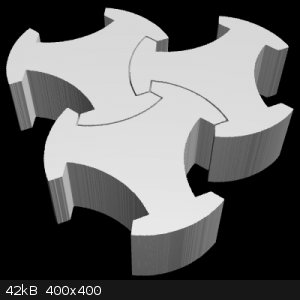
TRISPOKEDOVETILES by Peter Dow
Possible application to tiled armour
One issue with hexagonal or square armour tiles is that such simple shapes don't interlock sideways, as do jigsaw puzzle pieces.
Whilst a little armour tile movement in the same direction as the bullet (normal to the armour plane) is useful in absorbing the kinetic energy of the
bullet (and much better than the armour tile absorbing the same kinetic energy by shattering), on the other hand, sideways tile movement (tangential
to the armour plane) leaves most unwelcome gaps in the armour in between separated tiles.
So armour tiles shaped like jigsaw puzzle shapes (or some hexagonal variation such as these trispokedovetiles) could perform well in this application.
TRISPOKEDOVETILES
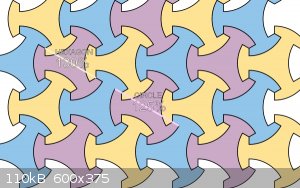
I've named the shape "Trispokedovetile" which is a contraction of "tri-spoke dovetailing tile".
"tri-spoke" because the shape is similar to a 3-spoke motorcycle
wheel with three bites taken out of it.
"dovetailing" because the tiles interlock like a dovetail joint
I've programmed a webpage using Javascript to display an animation which shows a range of different trispokedovetiles, each of which can be
specified by a "CIRCLE" percentage, which is the ratio as a percent of two parameters -
A "HEXAGON" parameter length - always nominally "100%"
A "CIRCLE" parameter length - the animation varies this between 100% and 135%, though values up to 150% can be drawn.
You can also use the webpage to specify a "CIRCLE" percentage and click to "Draw TRISPOKEDOVETILES" to generate an image of a tessellation of a
particular shape of trispokedovetiles.
Tutorial on how to create 3D trispokedovetile images
<i>Edit by moderator : Fixed broken links</i>
[Edited on 7-10-2017 by gdflp]
|
|
|
aga
Forum Drunkard
    
Posts: 7030
Registered: 25-3-2014
Member Is Offline
|
|
This an exceptionally Nice idea, and Welcome to ScienceMadness !
The simple geometry is Artful in it's simplicity.
You could cover Acres of a 2-D flat area with carbon tiles of that shape and protect it from crazed welders.
Unfortunately we live in a 3-D universe, with curves, bumps, wiggles etc.
What am i saying ?!?!
I like some of those curves, bumps and wiggles. A lot !
|
|
|
Peter Dow
Harmless

Posts: 9
Registered: 23-11-2016
Location: Aberdeen, Scotland
Member Is Offline
Mood: No Mood
|
|
Thanks. It's nice to be here.
Well there are more arty tessellations on a similar theme, some of which inspired me to a scientific purpose and more examples of which I have collected together at this link.
Quote: Originally posted by aga  | You could cover Acres of a 2-D flat area with carbon tiles of that shape and protect it from crazed welders.
Unfortunately we live in a 3-D universe, with curves, bumps, wiggles etc.
What am i saying ?!?!
I like some of those curves, bumps and wiggles. A lot !
|
Clearly, it is not the case that "one size fits all".
So different size and shapes of tiles could be made for different applications, smaller, slightly curved tiles for body armour, bigger tiles for
paving stone.
[Edited on 24-11-2016 by Peter Dow]
|
|
|
Maroboduus
Hazard to Others
  
Posts: 257
Registered: 14-9-2016
Location: 26 Ancho Street
Member Is Offline
Mood: vacant
|
|
Dragon skin armor?
https://www.google.com/url?sa=i&rct=j&q=&esrc=s&...
|
|
|
Peter Dow
Harmless

Posts: 9
Registered: 23-11-2016
Location: Aberdeen, Scotland
Member Is Offline
Mood: No Mood
|
|
Now to consider the important issue of interlocking trispokedovetiles against movement in the direction normal to the tiled plane, which for the
application of tiled armour would be the normal to the armour surface, in the direction of a bullet's path.
BILAYER TRISPOKEDOVETILES
I propose that the unit armour tile be comprised of 2 joined trispokedovetiles with matching HEXAGON parameters but each with a different CIRCLE
percentage.
For example, suppose we choose trispokedovetiles with CIRCLE = 100% and 121%.
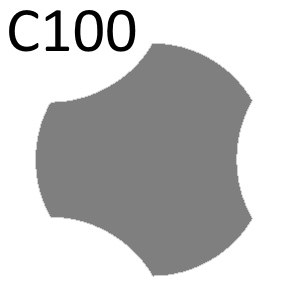 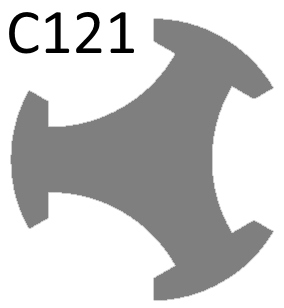
The reason for choosing C100 for the outer layer of the armour is because its 120 degree angle corners would be more robust.
The reason for choosing C121 for the inner layer of the armour is because CIRCLE = 121% offers the largest percentage where the neck attaching the
outer part rings is at least twice the thickness of the ring, attempting to balance the robustness of the ring parts to the robustness of the neck
versus tensile stresses.
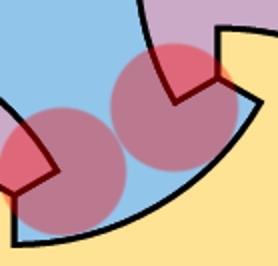
Stacking and joining those together forms a bilayer trispokedovetile, "C100+C121".
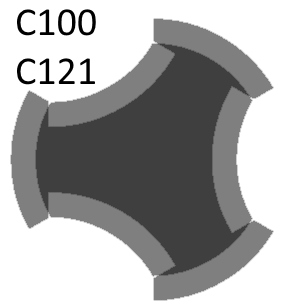 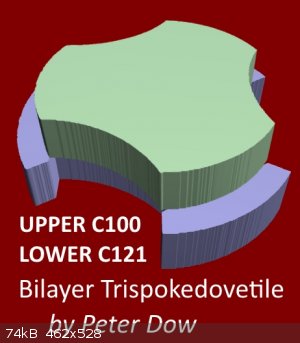
Drawing the 2 layers semi-transparently we can see how the bilayer trispokedovetiles would interlock in the normal to the plane.
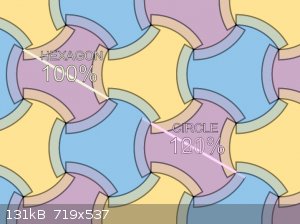
2/3rds of the tiles can be slotted together, either the yellows and the blues or the yellows and the purples or the blues and the purples.
However the final 1/3rd of the tiles would not simply slot in and would have to be inserted by joining the two halves of the bilayer trispokedovetile
in situ.
|
|
|
Sulaiman
International Hazard
    
Posts: 3734
Registered: 8-2-2015
Location: 3rd rock from the sun
Member Is Offline
|
|
for inspiration https://www.google.co.uk/search?q=m+c+escher&source=lnms...
CAUTION : Hobby Chemist, not Professional or even Amateur
|
|
|
Peter Dow
Harmless

Posts: 9
Registered: 23-11-2016
Location: Aberdeen, Scotland
Member Is Offline
Mood: No Mood
|
|
Trispokedovetiles: CNC code to cut tiles
For Computer-Aided Manufacturing of trispokedovetiles, I'm publishing today my new Javascript web-page -
Trispokedovetiles: CNC code to cut tiles web-page G-code generator
- which generates Computer Numerical Control (CNC) code which I've tested with CNC Simulator Pro but not on a real CNC cutter as yet.
<i>Edit by moderator : Fixed broken links</i>
[Edited on 7-10-2017 by gdflp]
|
|
|
elementcollector1
International Hazard
    
Posts: 2684
Registered: 28-12-2011
Location: The Known Universe
Member Is Offline
Mood: Molten
|
|
Could the tiles be 3D-printed? This might introduce some tolerance issues with the resolution of the print, but it would be a good way to test these
mechanically with different plastics such as ABS and PLA.
Also, could a flexible design be made by curving the interlocking plates somewhat on the z-axis (I don't quite know how to word this) so that each
tile could flex outward and inward from the main body? This would allow the armor to be 'worn' in much the same vein as Kevlar, if the tiles could be
made small enough.
Elements Collected:52/87
Latest Acquired: Cl
Next in Line: Nd
|
|
|
Peter Dow
Harmless

Posts: 9
Registered: 23-11-2016
Location: Aberdeen, Scotland
Member Is Offline
Mood: No Mood
|
|
HOLES!
Now cut trispokedovetiles by CNC laser cutter with (or without) HOLES!
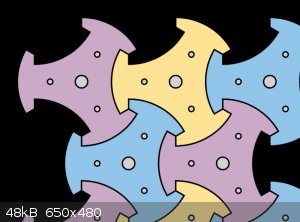
<i>Edit by moderator : Fixed broken links</i>
[Edited on 7-10-2017 by gdflp]
|
|
|
Peter Dow
Harmless

Posts: 9
Registered: 23-11-2016
Location: Aberdeen, Scotland
Member Is Offline
Mood: No Mood
|
|
Quote: Originally posted by elementcollector1  | | Could the tiles be 3D-printed? This might introduce some tolerance issues with the resolution of the print, but it would be a good way to test these
mechanically with different plastics such as ABS and PLA. |
Well don't let me stop you but I think starting off with a strong material in a flat sheet and cutting that up (as with laser cutting) is going to
give stronger and quicker tiles then anything 3D printed.
Quote: Originally posted by elementcollector1  | | Also, could a flexible design be made by curving the interlocking plates somewhat on the z-axis (I don't quite know how to word this) so that each
tile could flex outward and inward from the main body? This would allow the armor to be 'worn' in much the same vein as Kevlar, if the tiles could be
made small enough. |
Dragon Skin armour is a modern variant of scale armour, where the tiles overlap, rather than interlock like jigsaw puzzle pieces.
Whether you could get the same flexibility from smaller interlocking tiles, I don't know. Maybe.
For some applications - armoured vehicles, for example, flexibility is not the number one problem.
[Edited on 11-12-2016 by Peter Dow]
[Edited on 11-12-2016 by Peter Dow]
|
|
|
aga
Forum Drunkard
    
Posts: 7030
Registered: 25-3-2014
Member Is Offline
|
|
3D. Hmm.
Could you design something so that there is a step to the tiles so that a piece overlaps the joints ?
Having a 'crack' at each joint seems like a point of vulnerability.
|
|
|
Peter Dow
Harmless

Posts: 9
Registered: 23-11-2016
Location: Aberdeen, Scotland
Member Is Offline
Mood: No Mood
|
|
Quote: Originally posted by aga  | 3D. Hmm.
Could you design something so that there is a step to the tiles so that a piece overlaps the joints ?
Having a 'crack' at each joint seems like a point of vulnerability. |
I already did just that 4 posts ago.
What part of the overlapping of joints in my bilayer trispokedovetile design in my previous post ...
Quote: Originally posted by Peter Dow  | Now to consider the important issue of interlocking trispokedovetiles against movement in the direction normal to the tiled plane, which for the
application of tiled armour would be the normal to the armour surface, in the direction of a bullet's path.
BILAYER TRISPOKEDOVETILES
I propose that the unit armour tile be comprised of 2 joined trispokedovetiles with matching HEXAGON parameters but each with a different CIRCLE
percentage.
For example, suppose we choose trispokedovetiles with CIRCLE = 100% and 121%.
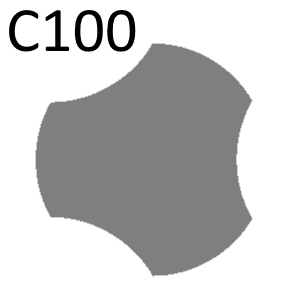 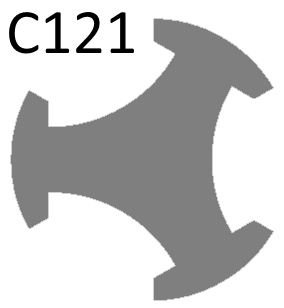
The reason for choosing C100 for the outer layer of the armour is because its 120 degree angle corners would be more robust.
The reason for choosing C121 for the inner layer of the armour is because CIRCLE = 121% offers the largest percentage where the neck attaching the
outer part rings is at least twice the thickness of the ring, attempting to balance the robustness of the ring parts to the robustness of the neck
versus tensile stresses.
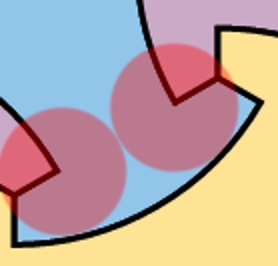
Stacking and joining those together forms a bilayer trispokedovetile, "C100+C121".
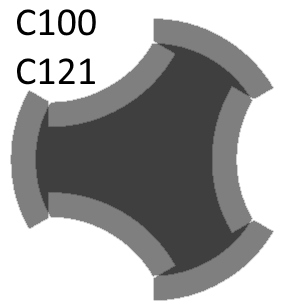 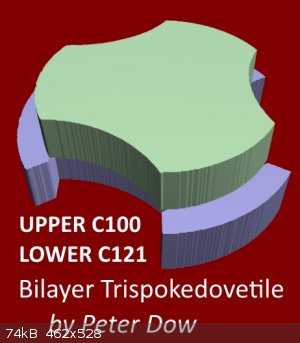
Drawing the 2 layers semi-transparently we can see how the bilayer trispokedovetiles would interlock in the normal to the plane.
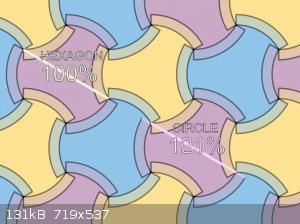
2/3rds of the tiles can be slotted together, either the yellows and the blues or the yellows and the purples or the blues and the purples.
However the final 1/3rd of the tiles would not simply slot in and would have to be inserted by joining the two halves of the bilayer trispokedovetile
in situ.
|
... did you not understand?
|
|
|
Peter Dow
Harmless

Posts: 9
Registered: 23-11-2016
Location: Aberdeen, Scotland
Member Is Offline
Mood: No Mood
|
|
TRISPOKEDOVETILES ROUTER CUTTING
My trispokedovetile CAD-CAM webpage now offers an (X,Y,Z) option for router cutting using rotary tool paths between spaced out tiles -
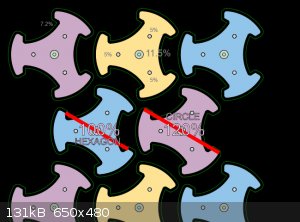
I've simulated the CNC router code -
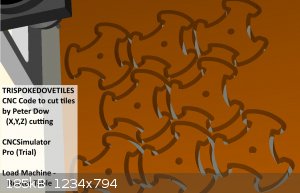
<i>Edit by moderator : Fixed broken links</i>
[Edited on 7-10-2017 by gdflp]
|
|
|
aga
Forum Drunkard
    
Posts: 7030
Registered: 25-3-2014
Member Is Offline
|
|
Opps. Sorry.
|
|
|
unionised
International Hazard
    
Posts: 5128
Registered: 1-11-2003
Location: UK
Member Is Offline
Mood: No Mood
|
|
Just a thought:
could you see if you can find the space key on your computer keyboard?
That will stop people wondering why you have poked these three times
https://www.zazzle.co.uk/ove+tiles
Or you could try some other way to stop it saying
TrisPokedOveTiles
|
|
|
Peter Dow
Harmless

Posts: 9
Registered: 23-11-2016
Location: Aberdeen, Scotland
Member Is Offline
Mood: No Mood
|
|
BEWARE BAD LINKS ABOVE!
I lost my website hosting in January. I was not "hacked" but the gcehosting administrator seems to have gone out of business and the hosting company
he was using (godaddy) is serving various spurious adverts whenever anyone clicks one of my old links.
I have got the following pages back on-line with a different hosting company now so try these links.
LINKS -
I can't edit my earlier posts to correct the old links, sorry.
I've not done anything with this project since January.
|
|
|
gdflp
Super Moderator
      
Posts: 1320
Registered: 14-2-2014
Location: NY, USA
Member Is Offline
Mood: Staring at code
|
|
The links have been corrected.
|
|
|